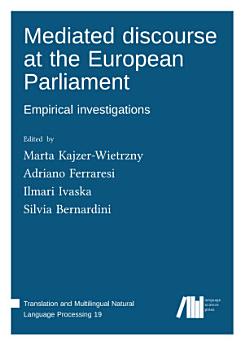Mediated discourse at the European Parliament: Empirical investigations
About this ebook
In this volume, progress is visible in both CBIS and CBTS. In interpreting, it manifests itself notably in the availability of comprehensive transcription, annotation and alignment systems. In translation, datasets are becoming substantially richer in metadata, which allow for increasingly refined multi-factorial analysis. At the crossroads between the two fields, intermodal investigations bring to the fore what these mediation modes have in common and how they differ. The volume is thus aimed in particular at Interpreting and Translation scholars looking for new descriptive insights and methodological approaches in the investigation of mediated discourse, but it may be also of interest for (corpus) linguists analysing parliamentary discourse in general.
About the author
Marta Kajzer-Wietrzny is an assistant professor in the Department of Translation Studies at the Faculty of English, Adam Mickiewicz University in Poznań. Following her PhD dissertation on Interpreting universals and interpreting style (2012) she continues with empirical investigations of interpreted, translated and non-native language use e.g. within the TRINFO project carried out in part during a research stay at the University of Bologna in 2018-2019. She participated in two corpus-compilation initiatives making use of the European Parliament data: EPTIC (European Translation and Interpreting Corpus) and PINC (Polish Interpreting Corpus). At times she attempts to combine corpus methods with process research such as key-logging and eye-tracking, in particular while looking into the traits and the process of inter- and intralingual translation.
Adriano Ferraresi is associate professor of English language and translation at the University of Bologna, and a member of the Board of the Doctorate in Translation, Interpreting and Intercultural Studies of the same University. His main research interests are in the field of construction of linguistic resources, and has been involved in several collaborative corpus construction projects, including the WaCky and Eurolect Observatory initiatives, and, since 2016, the EPTIC project. On the more descriptive side, his work focuses on corpus-based investigations of phraseology and terminology in native, translated and lingua franca varieties of English, looking for commonalities and distinctive traits of these forms of mediated language production.
Ilmari Ivaska is assistant professor of Finnish at the School of Languages and Translation Studies of the University of Turku, Finland. His research focuses on data-driven corpus methodologies and their applications in studying typical tendencies in texts written by L2 language users and, more recently, translated texts written by L1 language users, when compared to non-translated texts written by L1 language users. The investigation of new ways to study linguistic divergence between different modes of language use lie at the core of Ivaska’s research interests. He finds it fascinating that the factors to-be-taken-into-account can range from genres to the communication task at hand, and from the nativeness of the language users to constraining factors of multilingual communication – and the myriad relationships between these factors.
Silvia Bernardini is professor of English linguistics and translation at the Department of Interpreting and Translation of the University of Bologna, Italy, where she teaches translation from English into Italian and corpus linguistics. She has published widely on corpus use in translator education and for translation practice and research. Her research interests include the investigation of the points of contact between translation and interpreting and translation and non-native writing, seen as instances of bilingual language use. Together with colleagues at the Universities of Bologna, Belgrade, Ljubljana, Louvain, Poznań and Turku, she has been involved in the construction of the intermodal and multilingual EPTIC corpus.








